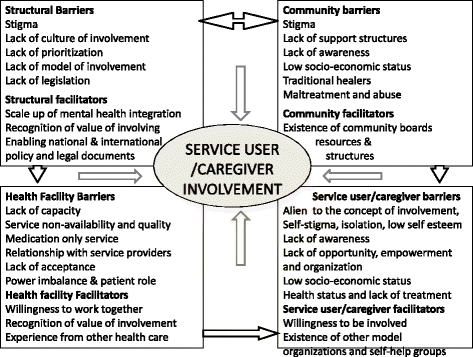Service user involvement in mental health system strengthening in a rural African setting: qualitative study
- PMID: 28521749
- PMCID: PMC5437561
- DOI: 10.1186/s12888-017-1352-9
Service user involvement in mental health system strengthening in a rural African setting: qualitative study
Abstract
Background: It is essential to involve service users in efforts to expand access to mental health care in integrated primary care settings in low- and middle-income countries (LMICs). However, there is little evidence from LMICs to guide this process. The aim of this study was to explore barriers to, and facilitators of, service user/caregiver involvement in rural Ethiopia to inform the development of a scalable approach.
Methods: Thirty nine semi-structured interviews were carried out with purposively selected mental health service users (n = 13), caregivers (n = 10), heads of primary care facilities (n = 8) and policy makers/planners/service developers (n = 8). The interviews were audio-recorded and transcribed in Amharic, and translated into English. Thematic analysis was applied.
Results: All groups of participants supported service user and caregiver involvement in mental health system strengthening. Potential benefits were identified as (i) improved appropriateness and quality of services, and (ii) greater protection against mistreatment and promotion of respect for service users. However, hardly any respondents had prior experience of service user involvement. Stigma was considered to be a pervasive barrier, operating within the health system, the local community and individuals. Competing priorities of service users included the need to obtain adequate individual care and to work for survival. Low recognition of the potential contribution of service users seemed linked to limited empowerment and mobilization of service users. Potential health system facilitators included a culture of community oversight of primary care services. All groups of respondents identified a need for awareness-raising and training to equip service users, caregivers, service providers and local community for involvement. Empowerment at the level of individual service users (information about mental health conditions, care and rights) and the group level (for advocacy and representation) were considered essential, alongside improved, accessible mental health care and livelihood interventions.
Conclusion: As Ethiopia increases access to mental health care, a fundamental barrier to service user involvement is beginning to be addressed. Our study identified further barriers that need to be tackled, including a supportive political climate, and receptiveness amongst stakeholders. The findings will inform the development of a model of service user involvement, which will be piloted and evaluated.
Keywords: Ethiopia; Mental health; Qualitative study; Service user and carer involvement.
Figures
Similar articles
-
Service user and caregiver involvement in mental health system strengthening in low- and middle-income countries: a cross-country qualitative study.Epidemiol Psychiatr Sci. 2018 Feb;27(1):29-39. doi: 10.1017/S2045796017000634. Epub 2017 Nov 8. Epidemiol Psychiatr Sci. 2018. PMID: 29113598 Free PMC article.
-
Service user involvement for mental health system strengthening in India: a qualitative study.BMC Psychiatry. 2016 Jul 28;16:269. doi: 10.1186/s12888-016-0981-8. BMC Psychiatry. 2016. PMID: 27465387 Free PMC article.
-
'Restoring the person's life': a qualitative study to inform development of care for people with severe mental disorders in rural Ethiopia.Epidemiol Psychiatr Sci. 2017 Feb;26(1):43-52. doi: 10.1017/S2045796015001006. Epub 2016 Mar 10. Epidemiol Psychiatr Sci. 2017. PMID: 26961343 Free PMC article.
-
Experiences of family caregivers in forensic mental health care-A qualitative evidence synthesis.J Psychiatr Ment Health Nurs. 2023 Aug;30(4):663-678. doi: 10.1111/jpm.12910. Epub 2023 Feb 20. J Psychiatr Ment Health Nurs. 2023. PMID: 36739887 Review.
-
Barriers and facilitators of mental health programmes in primary care in low-income and middle-income countries.Lancet Psychiatry. 2020 Jan;7(1):78-92. doi: 10.1016/S2215-0366(19)30125-7. Epub 2019 Aug 29. Lancet Psychiatry. 2020. PMID: 31474568
Cited by
-
Empowerment training to support service user involvement in mental health system strengthening in rural Ethiopia: a mixed-methods pilot study.BMC Health Serv Res. 2022 Jul 8;22(1):880. doi: 10.1186/s12913-022-08290-x. BMC Health Serv Res. 2022. PMID: 35799252 Free PMC article.
-
Educational and training interventions aimed at healthcare workers in the detection and management of people with mental health conditions in South and Southeast Asia: systematic review protocol.BMJ Open. 2021 Jul 2;11(7):e045615. doi: 10.1136/bmjopen-2020-045615. BMJ Open. 2021. PMID: 34215602 Free PMC article.
-
Consent, decisional capacity and guardianship in mental health research.Wellcome Open Res. 2023 Jun 15;7:183. doi: 10.12688/wellcomeopenres.18003.2. eCollection 2022. Wellcome Open Res. 2023. PMID: 37409220 Free PMC article.
-
Strengthening mental health systems in low- and middle-income countries: recommendations from the Emerald programme.BJPsych Open. 2019 Aug 6;5(5):e73. doi: 10.1192/bjo.2018.90. BJPsych Open. 2019. PMID: 31530325 Free PMC article.
-
Implementing civic engagement within mental health services in South East Asia: a systematic review and realist synthesis of current evidence.Int J Ment Health Syst. 2020 Mar 10;14:17. doi: 10.1186/s13033-020-00352-z. eCollection 2020. Int J Ment Health Syst. 2020. PMID: 32175004 Free PMC article. Review.
References
-
- Grundy A, Bee P, Meade O, Callaghan P, Beatty S, Olleveant N, et al. Bringing meaning to user involvement in mental health care planning: a qualitative exploration of service user perspectives. J Psychiatr Ment Health Nurs. 2015;23:12–21. - PubMed
MeSH terms
LinkOut - more resources
Full Text Sources
Other Literature Sources
Medical
Molecular Biology Databases
Research Materials


